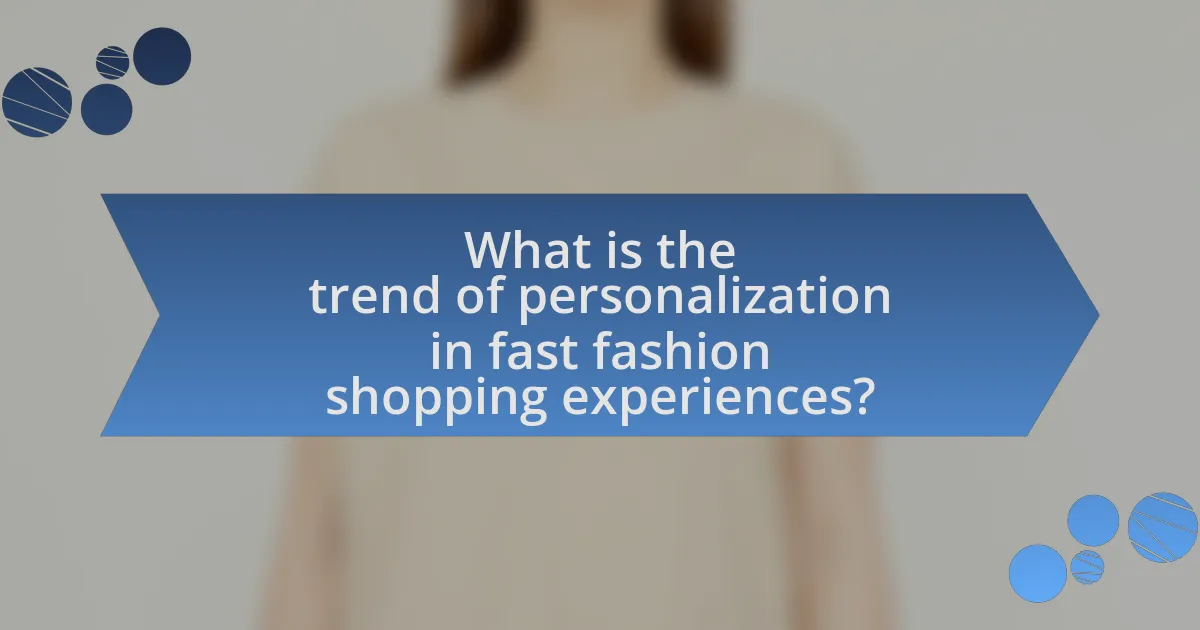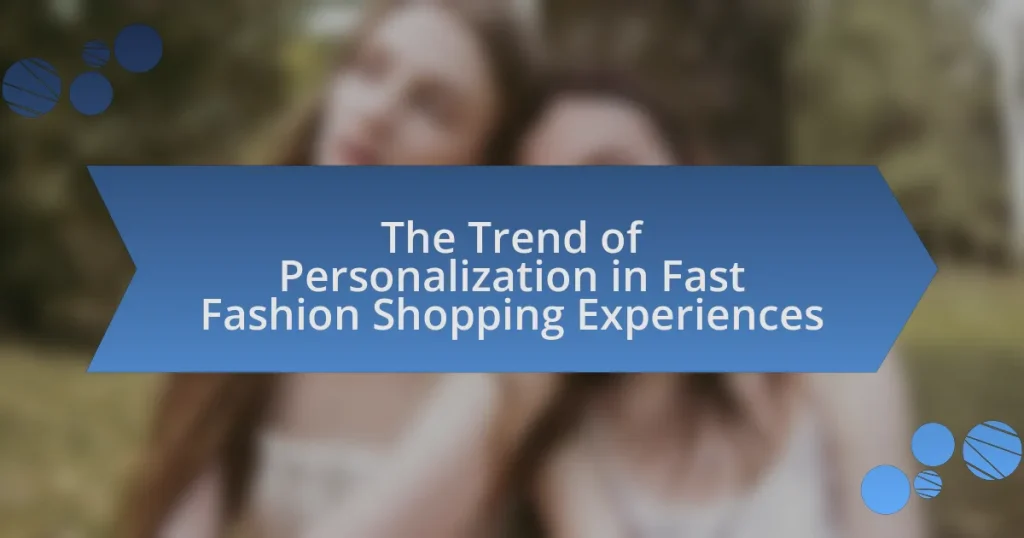The article examines the trend of personalization in fast fashion shopping experiences, highlighting how retailers leverage data analytics and artificial intelligence to tailor offerings to individual consumer preferences. It discusses the evolution of personalization strategies, the technological advancements driving these changes, and the impact of consumer expectations on brand loyalty and sales. Additionally, the article addresses the challenges and ethical considerations associated with personalization, including data privacy concerns and sustainability issues, while outlining best practices for enhancing personalized shopping experiences in the fast fashion industry.

What is the trend of personalization in fast fashion shopping experiences?
The trend of personalization in fast fashion shopping experiences is increasingly focused on leveraging data analytics and artificial intelligence to tailor offerings to individual consumer preferences. Retailers are utilizing customer data to create personalized recommendations, enhance user interfaces, and optimize inventory based on shopping behaviors. For instance, brands like ASOS and Zara employ algorithms that analyze past purchases and browsing history to suggest items that align with a customer’s style, resulting in higher engagement and conversion rates. According to a report by McKinsey, personalized shopping experiences can lead to a 10-30% increase in sales, highlighting the effectiveness of this trend in driving consumer satisfaction and loyalty.
How has personalization evolved in the fast fashion industry?
Personalization in the fast fashion industry has evolved significantly through the integration of data analytics and technology. Initially, brands relied on broad demographic data to tailor their offerings, but advancements in artificial intelligence and machine learning now enable companies to analyze individual consumer behavior and preferences in real-time. For instance, retailers like Zara and H&M utilize customer data from online interactions and in-store purchases to create personalized marketing campaigns and product recommendations, enhancing the shopping experience. This shift has led to a more targeted approach, with brands reporting increased customer engagement and sales as a result of personalized strategies. According to a study by McKinsey, personalized experiences can lead to a 10-30% increase in sales, demonstrating the effectiveness of this evolution in fast fashion.
What technological advancements have driven personalization in fast fashion?
Technological advancements such as artificial intelligence (AI), data analytics, and augmented reality (AR) have significantly driven personalization in fast fashion. AI algorithms analyze consumer behavior and preferences, enabling brands to offer tailored recommendations and targeted marketing. Data analytics allows companies to gather insights from customer interactions, optimizing inventory and enhancing the shopping experience. AR technology provides virtual fitting rooms, allowing customers to visualize how clothing will look on them, further personalizing their shopping journey. These advancements collectively enhance customer engagement and satisfaction, leading to increased sales and brand loyalty.
How do consumer expectations influence personalization trends?
Consumer expectations significantly influence personalization trends by driving brands to tailor their offerings to meet individual preferences. As consumers increasingly demand unique and relevant shopping experiences, fast fashion retailers are adopting advanced data analytics and AI technologies to create personalized recommendations and targeted marketing strategies. For instance, a study by McKinsey & Company found that personalized experiences can lead to a 10-30% increase in sales, demonstrating that meeting consumer expectations through personalization not only enhances customer satisfaction but also boosts revenue.
Why is personalization important in fast fashion shopping?
Personalization is important in fast fashion shopping because it enhances customer engagement and satisfaction, leading to increased sales. Fast fashion brands utilize data analytics to tailor recommendations and marketing strategies to individual preferences, which has been shown to improve conversion rates. For instance, a study by McKinsey & Company found that personalized experiences can lead to a 10-30% increase in revenue for retailers. By aligning product offerings with consumer behavior, fast fashion retailers can effectively meet the diverse needs of their target audience, fostering brand loyalty and repeat purchases.
What benefits does personalization offer to consumers?
Personalization offers consumers enhanced shopping experiences by tailoring products and services to individual preferences and behaviors. This customization leads to increased satisfaction, as consumers receive recommendations that align closely with their tastes, resulting in a more efficient shopping process. Research indicates that 80% of consumers are more likely to make a purchase when brands offer personalized experiences, highlighting the effectiveness of personalization in driving sales and customer loyalty.
How does personalization impact brand loyalty in fast fashion?
Personalization significantly enhances brand loyalty in fast fashion by creating tailored shopping experiences that resonate with individual consumer preferences. When brands utilize data analytics to offer personalized recommendations, promotions, and communications, they foster a deeper emotional connection with customers. Research indicates that 80% of consumers are more likely to make a purchase when brands offer personalized experiences, demonstrating that personalization directly influences purchasing behavior and repeat visits. Additionally, personalized marketing strategies can lead to increased customer satisfaction and retention, as consumers feel valued and understood, which is crucial in the competitive fast fashion industry.

What are the key strategies for implementing personalization in fast fashion?
Key strategies for implementing personalization in fast fashion include leveraging data analytics, utilizing AI-driven recommendation systems, and enhancing customer engagement through targeted marketing. Data analytics allows brands to gather insights on consumer preferences and behaviors, enabling tailored product offerings. AI-driven recommendation systems analyze past purchases and browsing history to suggest items that align with individual tastes, increasing conversion rates. Targeted marketing, through personalized emails and social media ads, fosters a deeper connection with customers by presenting relevant content and promotions. These strategies are supported by studies indicating that personalized experiences can lead to a 20% increase in sales and improved customer loyalty.
How do data analytics contribute to personalized shopping experiences?
Data analytics significantly enhance personalized shopping experiences by enabling retailers to analyze consumer behavior and preferences. By collecting and processing data from various sources, such as purchase history, browsing patterns, and demographic information, retailers can tailor product recommendations and marketing strategies to individual customers. For instance, a study by McKinsey & Company found that personalized recommendations can lead to a 10-30% increase in sales, demonstrating the effectiveness of data-driven personalization. This targeted approach not only improves customer satisfaction but also fosters brand loyalty, as consumers feel more understood and valued.
What types of consumer data are most valuable for personalization?
The most valuable types of consumer data for personalization include demographic information, purchase history, browsing behavior, and customer preferences. Demographic information, such as age, gender, and location, helps brands tailor their marketing strategies to specific audience segments. Purchase history provides insights into consumer preferences and buying patterns, enabling targeted recommendations. Browsing behavior, including pages visited and time spent on site, reveals interests and engagement levels, allowing for real-time personalization. Customer preferences, gathered through surveys or feedback, directly inform product offerings and marketing messages. Research indicates that personalized experiences can increase customer engagement by up to 74%, highlighting the importance of leveraging these data types effectively.
How can brands effectively analyze consumer behavior for personalization?
Brands can effectively analyze consumer behavior for personalization by utilizing data analytics tools to gather and interpret consumer data from various touchpoints. These tools enable brands to track purchasing patterns, preferences, and engagement metrics, allowing for a comprehensive understanding of individual consumer behaviors. For instance, a study by McKinsey & Company found that companies leveraging advanced analytics can increase their marketing ROI by 15-20%. By segmenting consumers based on their behavior and preferences, brands can tailor their offerings, messaging, and experiences to meet specific needs, thereby enhancing customer satisfaction and loyalty.
What role does artificial intelligence play in personalization?
Artificial intelligence plays a crucial role in personalization by analyzing consumer data to tailor shopping experiences. AI algorithms process vast amounts of information, such as browsing history, purchase patterns, and demographic data, to create individualized recommendations and marketing strategies. For instance, a study by McKinsey & Company found that companies using AI for personalization can increase their sales by 10% to 30%. This data-driven approach allows fast fashion retailers to enhance customer engagement and satisfaction by delivering relevant content and product suggestions, ultimately driving sales and loyalty.
How can AI enhance product recommendations in fast fashion?
AI can enhance product recommendations in fast fashion by analyzing consumer behavior and preferences through data-driven algorithms. These algorithms utilize machine learning to process vast amounts of data, including purchase history, browsing patterns, and social media interactions, allowing retailers to deliver personalized suggestions that align with individual tastes. For instance, a study by McKinsey & Company found that personalized recommendations can increase sales by 10% to 30%, demonstrating the effectiveness of AI in tailoring shopping experiences. By continuously learning from user interactions, AI systems can adapt recommendations in real-time, ensuring that consumers receive relevant options that reflect current trends and personal style.
What are the challenges of using AI for personalization in fast fashion?
The challenges of using AI for personalization in fast fashion include data privacy concerns, algorithmic bias, and the rapid pace of fashion trends. Data privacy concerns arise as companies collect and analyze vast amounts of consumer data, which can lead to potential breaches and loss of consumer trust. Algorithmic bias can occur when AI systems inadvertently favor certain demographics over others, resulting in a lack of inclusivity in personalized recommendations. Additionally, the fast fashion industry is characterized by quickly changing trends, making it difficult for AI systems to keep up and provide relevant personalization in real-time. These challenges highlight the complexities of effectively implementing AI in a sector that demands both speed and consumer sensitivity.

What are the challenges and ethical considerations of personalization in fast fashion?
The challenges and ethical considerations of personalization in fast fashion include environmental sustainability, labor exploitation, and consumer privacy. Fast fashion brands often prioritize rapid production and low costs, leading to significant environmental degradation, as the personalization process can increase waste through overproduction and unsold items tailored to individual preferences. Additionally, the reliance on cheap labor in developing countries raises ethical concerns, as workers may face poor working conditions and inadequate compensation. Furthermore, the collection and use of consumer data for personalization can infringe on privacy rights, as brands may not always transparently communicate how data is used or stored. These factors highlight the complex interplay between consumer demand for personalized experiences and the ethical implications of fast fashion practices.
What privacy concerns arise from personalized shopping experiences?
Personalized shopping experiences raise significant privacy concerns, primarily related to data collection and user consent. Retailers often gather extensive personal information, including browsing history, purchase behavior, and demographic details, to tailor recommendations. This data collection can lead to unauthorized use or sharing of personal information, as evidenced by incidents where companies have faced backlash for data breaches or misuse, such as the 2018 Facebook-Cambridge Analytica scandal, which highlighted the risks of personal data exploitation. Additionally, consumers may not fully understand how their data is being used or the extent of tracking, leading to a lack of informed consent. This lack of transparency can erode trust between consumers and brands, as individuals become increasingly aware of their privacy rights and the potential for surveillance in digital shopping environments.
How can brands ensure consumer data protection while personalizing experiences?
Brands can ensure consumer data protection while personalizing experiences by implementing robust data security measures and adhering to privacy regulations. This includes utilizing encryption technologies to safeguard sensitive information, conducting regular security audits, and ensuring compliance with regulations such as the General Data Protection Regulation (GDPR) and the California Consumer Privacy Act (CCPA). For instance, a study by the International Association of Privacy Professionals (IAPP) found that organizations that prioritize data protection not only enhance consumer trust but also improve customer loyalty, which is crucial in the fast fashion industry where personalization is key to competitive advantage.
What regulations impact personalization practices in fast fashion?
Regulations impacting personalization practices in fast fashion include data protection laws, consumer protection regulations, and advertising standards. Data protection laws, such as the General Data Protection Regulation (GDPR) in the European Union, require companies to obtain explicit consent from consumers before collecting and processing their personal data for personalized marketing. Consumer protection regulations mandate transparency in advertising, ensuring that personalized offers are not misleading. Additionally, advertising standards set guidelines on how brands can use consumer data to tailor marketing messages, ensuring ethical practices in personalization. These regulations collectively shape how fast fashion brands implement personalization strategies while safeguarding consumer rights.
How can brands balance personalization with sustainability in fast fashion?
Brands can balance personalization with sustainability in fast fashion by leveraging data analytics to create customized offerings while minimizing waste. By utilizing customer data, brands can produce limited runs of personalized items, reducing overproduction and excess inventory, which are significant contributors to environmental harm. For instance, a study by McKinsey & Company highlights that personalized marketing can increase customer engagement and sales, while also allowing brands to optimize their supply chains and reduce unsold stock. This approach not only meets consumer demand for unique products but also aligns with sustainable practices by promoting responsible consumption and reducing the carbon footprint associated with mass production.
What sustainable practices can be integrated into personalized shopping experiences?
Sustainable practices that can be integrated into personalized shopping experiences include utilizing data analytics to recommend eco-friendly products, offering virtual fitting rooms to reduce returns, and implementing a circular economy model through take-back programs. Data analytics allows retailers to tailor suggestions based on consumer preferences for sustainable brands, thereby promoting environmentally friendly choices. Virtual fitting rooms minimize the need for physical try-ons, which can lead to excess waste from returns. Additionally, take-back programs encourage customers to return used items for recycling or resale, fostering a sustainable lifecycle for products. These practices not only enhance the shopping experience but also align with growing consumer demand for sustainability in the fashion industry.
How does consumer demand for sustainability affect personalization strategies?
Consumer demand for sustainability significantly influences personalization strategies by prompting brands to tailor their offerings based on eco-conscious preferences. As consumers increasingly prioritize sustainable practices, companies in the fast fashion sector adapt their personalization efforts to highlight environmentally friendly products, ethical sourcing, and transparent supply chains. For instance, a survey by McKinsey & Company found that 67% of consumers consider sustainability when making purchase decisions, leading brands to leverage data analytics to create personalized recommendations that align with these values. This shift not only enhances customer engagement but also fosters brand loyalty among environmentally aware shoppers.
What are best practices for enhancing personalization in fast fashion shopping experiences?
Best practices for enhancing personalization in fast fashion shopping experiences include leveraging data analytics, utilizing AI-driven recommendations, and implementing customer feedback mechanisms. Data analytics allows retailers to understand customer preferences and shopping behaviors, enabling tailored marketing strategies. AI-driven recommendations, such as personalized product suggestions based on browsing history, can significantly increase conversion rates; for instance, a study by McKinsey found that personalized recommendations can drive 10-30% of revenue for online retailers. Additionally, actively seeking and incorporating customer feedback helps brands refine their offerings and improve customer satisfaction, as evidenced by a report from PwC indicating that 73% of consumers prefer brands that use their feedback to enhance experiences.












